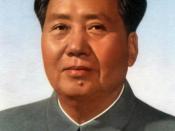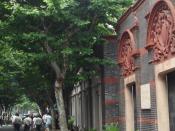Mao was born in the village of Sheehan in the Hunan Province of China. His father was a peasant farmer whom he early learned to defy. His mother was a devout Buddhist. After graduating from a teacher's training in Changsha, he continued his studies at the University of Beijing. In 1921 Mao became a founding member of the Chinese Communist Party. In the 1920s he concentrated on political work in his native Province and Jinx Province. His highly pragmatic strategy was one of the main influences on Fidel Castro when in 1959 he was able to take over Cuba with Che Guevara. Mao recognized the revolutionary potential of the peasantry when Marx and Lenin had seen in their urban doctrine the working class as the leading revolutionary force. Mao himself was also an exception to the rule: he was one of only three peasants to gain control of his country throughout its long history-the others were from the Han and Ming dynasties.
After the break with the Nationalist Party Mao started the guerilla tactics, but in 1934 the Nationalist government destroyed the Jiangxi Soviet, and the Communist forces started the legendary retreat and the Long March. However, Mao's rural based guerilla warfare led to the fall of the government and the new People's Republic of China was proclaimed in 1949. Mao headed the Communists; he gained the upper hand over his Russian-backed adversaries. Mao's prestige was reinforced by his "Thought." This was a personal ideology designed to circumvent opponents who were better theoreticians than he was by labeling their ideas as "mechanical" or "dogmatic." The ideology was a combination of Marxism-Leninism, adapted to Chinese conditions; partly Mao's own ideas and partly developed for him by such CCP's theoreticians as Chen Boda and Ai Siqi. The support of the Communists...


